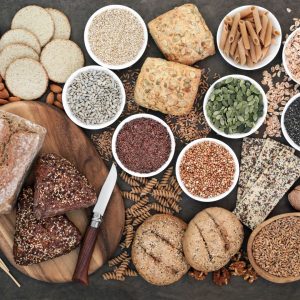 As a nutritionist I talk to my clients regularly about the importance of fibre. I have also discussed in this article different types of fibre and prebiotics before.
As a nutritionist I talk to my clients regularly about the importance of fibre. I have also discussed in this article different types of fibre and prebiotics before.
Most people will say “Of course fibre is important, we all know that. It helps make you poo!” Well yes it does help you to pass bowel motions easier, but fibre is essential in helping the formation of your poo and supporting good gut microbiome.
There are many people adopting low fibre diets in various formats eg Low FODMAP, Keto and the more extreme end of no fibre diet – the Carnivore diet. (Click here for my article on this particular diet).
Yes the low FODMAP diet and some other low fibre diets can help people that are having issues with their bodies fermenting fibres or have conditions like SIBO (small intestinal bacterial overgrowth) or candida (yeast overgrowth). But these diet strategies should only be short term while addressing the cause of these conditions. I work with these conditions regularly in my clinic and emphasise to my clients that these diet strategies are only short term, while we get on top of the issues.
None of the above mentioned diets should be stayed on long term. Eg around 3 months to 6 months of reduced or no fibre in the diet will start to impact your gut flora (good bacteria in your bowel).
Additionally, other people are not specifically seeking out low fibre diets but are consuming high density of processed/packaged foods which are nearly void of fibre, which can also be just as harmful.
Reasons why we need fibre in our diet:
- Fibre feeds our good bacteria bugs. If we are not eating fibre the bad bacteria will flourish and many of these create inflammation in our gut and then for the rest of our body. Hence, it is necessary to consume fiber to sustain healthy levels of good bacteria and reduce inflammation.
- To help remove toxins from our body. But not just toxins, we also need adequate fibre for the body to remove excess hormones eg estrogen (rather than cycling it back into the body, which can be a cause of oestrogen dominance). Fibre is also important for the body to eliminate excess cholesterol that the body isn’t using (remember not all cholesterol is bad – we don’t want to get rid of all of it from our body).
- Following a meat only diet may cause major nutrient deficiencies as there is limited fibre in this approach. We also receive a number of other crucial nutrients from plants that we don’t get from just eating meat. For example, humans, guinea pigs, other primates, fruit bats, capybara and some reptiles are the only ones in the animal kingdom that do not make our own vitamin C. It is crucial for us to eat plant foods to obtain vitamin C.
- Fibre helps us to feel fuller for longer. This can help prevent from overeating and gaining weight or help in the reduction in weight or weight management.
- Fibre can help lower blood pressure and help control blood sugar levels (reducing insulin sensitivity).
- A large part of our immune system is in our gut – 70-80%!!! Consuming fibrous foods is necessary to nourish the bacteria that support our gut’s immune cells’ optimal function. Harmful bacteria in our gut can affect our thoughts and feelings, thereby influencing our mood.
Many people claim how amazing they feel reducing or cutting out fibre from their diet, as there are many success stories of keto and carnivore diets. But as these types of lifestyles are still fairly new in the scheme of things, I feel their short-term benefits will not meet or maintain their long-term health.
If you have been avoiding fibre to feel better or have been on the low FODMAP diet for years and still not feeling at your optimal, book an appointment with me to discuss how we can re-introduce fibre into your diet or explore why low FODMAP may not be working for you.
Contact Megan Crockart on 0417679287 or megan@balancingnutrition.com.au

